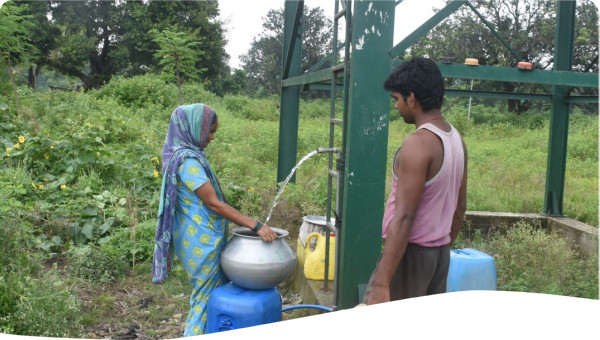A previous lack of clearly defined roles and jurisdictional responsibilities within the water sector led Zambia’s government to take action and establish the National Water Supply and Sanitation Council, which is presently responsible for the main water policy principles. From this case, it can be concluded that any reform process is inherently political and requires the full commitment of its policy makers to correctly balance financial and political objectives.
Prior to the sector reforms of 1994, the Zambian water sector was characterised by lack of guiding policy, very low cost recovery, poor human resource both in terms of quality and quantity, decrepit infrastructure, and little or no investment for network expansion. As a result of these problems, the water infrastructure throughout the country deteriorated to such an extent that over half of the water produced was lost before reaching the consumer. Lack of clearly defined roles and jurisdictional responsibilities led to both policy gaps and duplication of efforts in the sector system. There was no legislation to guide water and sanitation service provision and the management of water resources was not handled in a comprehensive manner. On the whole, the entire sector was disorganised and service provision undesirable. The quality of water produced soon became a health hazard.
In 1994, the Government committed itself to transforming the water sector so as to ensure quality provision of water supply and sanitation, at affordable costs and on a sustainable basis. In 1997, the Government passed a National Water Policy in which seven sector principles were outlined as follows:
- Separation of regulation and executive functions;
- Devolution of supply responsibility to local authorities and private enterprise;
- Promotion of appropriate technology for local conditions (in terms of ability to pay)
- Increased Government, (GRZ) spending on Water Supply Services, WSS.
- Creation of effective institutions through human resource development and capacity building;
- Fully cost recovery through user changes (over the long term);
- Separation of Water Resources Regulation from Water Supply and Sanitation, (WSS), Regulation.
The case study focuses on the role of the regulatory institution in implementing some of those principle – promoting cost-effective delivery of WSS.
To separate regulatory and executive (policy) functions within the water supply and sanitation sector, the National Water Supply and Sanitation Council (NWASCO) was established as an independent regulator to implement policy. The powers of NWASCO are vested in the Water Supply and Sanitation Act No. 28 of 1997. Policy implementation involves creating rules and priorities that sequence tasks and (effectively) involves policy development. However, the broad national objectives are determined at the ministerial level.
With the powers vested in the Water Supply and Sanitation Act, NWASCO now acts as agent for attaining the seven sector principles earlier outlined, that are the pillars for the water sector reforms. Water supply and sanitation service provision has been devolved to the Local Authorities and commercialised.
The case study discusses institutional arrangements of the NWASCO, its inspectors, and voluntary water watch group initiatives.
It summarizes tools used for regulation including licensing, information and management information systems and analysis, subsidies, benchmarking, and standard setting.
NWASCO has implemented a number of organizational innovations and procedures to make regulation effective including Desk Officers, meetings, human resource management and development, rewards and penalties, a Strategic Plan, and a Performance Monitoring and Rewarding System.
The case study documents the process, the major lessons and experiences which may be of interest to other countries considering an institutional reform. Many developing countries have yet to face the reality of translating the principles of IWRM into workable solutions that can be applied in real-life situations. Much can be learned from the successes, the failures, and the ongoing challenges that Zambia is experiencing in trying to address the water and sanitation service needs of its citizens.
NWASCO’s experience has been recognised both within and outside the region. It participates in a number of workshops and conferences where other regulators are present to learn from its experiences. It also accommodates visits from a number of these regulators within the region to assist them develop effective tools for regulation.
In the country, the regulator has gained the recognition and respect of the stakeholder groups: politicians, consumers, and providers. By using internal incentives and promoting performance-based incentive systems internally and in the Commercial Utilities (CUs), NWASCO serves as a model for other government agencies.
The major challenge that NWASCO faces however, involves balancing the interests of competing parties: operating managers do not like hard targets; political leaders seek to have time horizons that extend to the next election; current customers wish to maintain current (below-cost) prices; and the media tends to promote controversy by selectively publicising particular events or outcomes. However, some managers are able to out-perform others and benefit from strong incentives; political leaders can be held accountable for campaign promises and many wish to have a legacy of sound infrastructure; un-served (potential) customers are paying much more for non-utility water (in time and money); and the media is in a position to inform the public and opinion-leaders about the status of the water sector.
As the regulatory body responsible for implementing government policy, NWASCO can play a key role in strengthening water utility performance and in obtaining national and external funds for network expansion. Although the positive trends (as seen from two case studies) are similar for the rest of the CUs, the system is far from achieving its long-term objectives.
The reform process is inherently political and requires the full commitment of its policy makers to correctly balance financial and political objectives. Fundamental reforms are not a quick fix and cannot be substituted by private sector participation.
Success is often unattainable without reforming the external environment, with emphasis on the role of the owner.
Other external stakeholders may be important to balance potentially conflicting objectives of politicians.
Certain decisions must be left to utility managers.
Customers can be an important voice for improving performance.
 Case studies
Case studies



